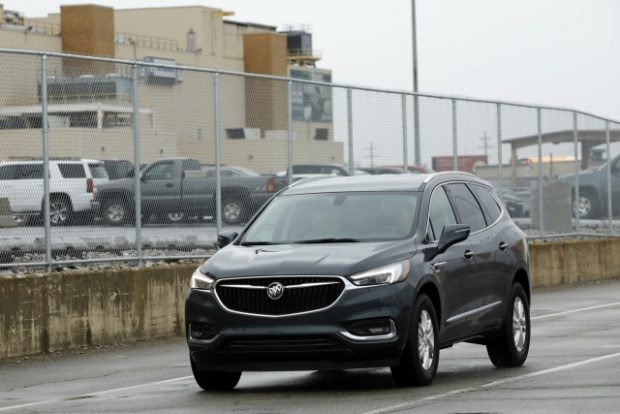
General Motors reported on January 5, 2021 an annual drop in U.S. auto sales despite a strong fourth quarter that reflected a surprisingly robust recovery from the disruption of COVID-19. Image: AFP/JEFF KOWALSKY
General Motors and Toyota reported strong United States sales at the end of 2020 on Tuesday, Jan. 5, reflecting surprisingly robust consumer demand that mitigated the sales drop for the full year in the wake of COVID-19.
The pair are the top two automakers by U.S. market share and both scored higher sales in the fourth quarter despite notching double-digit sales declines for all of 2020.
U.S. auto sales for 2020 are projected to drop 15.3% to 14.4 million, which would make it the worst year since at least 2012, according to a December forecast from Cox Automotive.
Still, those numbers are much better than analysts feared after the U.S. car market almost completely froze during spring lockdowns as the country contended with a spiraling coronavirus crisis.
“Everybody is excited the market has done as well as it has,” said Charles Chesbrough, senior economist at Cox Automotive. “We’re getting back to normal much more quickly than expected.”
While the pandemic has caused elevated unemployment and long lines at food pantries, other consumers have more cash for cars and other big-ticket items due to less spending on travel and other discretionary goods, and many have benefited from federal stimulus funds.
“If you haven’t lost your job, the government has been giving away money,” said Chesbrough, who thinks the industry could benefit in the second half of 2021 from a recovering U.S. economy bolstered by vaccinations and additional federal spending.
Chesbrough said auto companies have been able to keep selling incentives in check due to limited inventories. However, sales could sag in the first quarter if the worsening pandemic crimps demand.
Optimism for 2021
GM cited continued consumer hunger for pickup trucks, sport utility vehicles and other large cars that enabled the auto giant to score record average transaction prices in the fourth quarter and for the full year.
The auto giant reported a 4.8% increase in U.S. auto sales in the final three months of the year, to 771,323, topping analyst estimates.
But GM’s overall sales for 2020 fell 11.8% to 2.5 million compared with 2019, reflecting the hit from a nearly two-month disruption to auto manufacturing due to the initial U.S. COVID-19 outbreak.
Since then, automakers have overhauled plants to respect social distancing protocols, enabling car output to return roughly to pre-pandemic levels.
GM said year-end inventories stood at about 33% below 2019 levels, but offered an upbeat outlook for the year.
“We look forward to an inflection point for the U.S. economy in the spring,” GM chief economist Elaine Buckberg said.
“Widening vaccination rates and warmer weather should enable consumers and businesses to return to a more normal range of activities, lifting the job market, consumer sentiment and auto demand.”
At Toyota, fourth-quarter sales were up 9.4% at 660,715. However, full-year sales came in at 2.1 million, 11.3% below the 2019 level.
In contrast, Fiat Chrysler reported a fourth-quarter sales decline of eight percent to 499,431 and a 17% drop for the year to 1.8 million.
FCA attributed the drop to plunging fleet orders, particularly from car rental companies.
But Jeff Kommor, FCA’s head of sales, said the fourth quarter provided “strong springboard” into 2021.
“The economic indicators are pointing in the right direction,” Kommor said, noting that “Gas prices remain low… and consumers have access to credit.”
Among other automakers, Volkswagen posted a fourth quarter gain but annual sales fell 10% to 325,784.
Nissan, however, lost ground in the last three months of 2020 and reported a 33.2% drop in annual sales to 819,715. CC
RELATED STORIES:
Europeans avoid public transport, buy old cars
Fiat Chrysler and PSA close in on mega-merger

